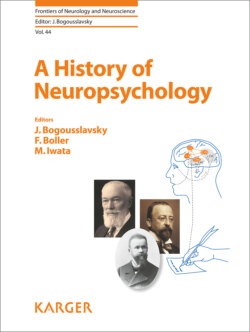Читать книгу A History of Neuropsychology - Группа авторов - Страница 70
На сайте Литреса книга снята с продажи.
1861: Broca’s Aphemia
ОглавлениеBouillaud’s notion of a speech center in the anterior lobes was refined by Broca. In 1861, members of the Anthropological Society of Paris, co-founded by Broca the year before, debated the relation between intelligence and brain size. Noting that the brain is a complex organ, a debate participant – Bouillaud’s son-in-law Ernest Auburtin (1825–1893) – asked whether different parts of the brain should be considered separately. He mentioned a patient who had lost speech but who retained the ability to understand and, further, he predicted that an autopsy would eventually confirm a softening (stroke) within the anterior lobes in accordance with Bouillaud’s ideas [8].
By remarkable coincidence, a man with similar symptoms was admitted to Broca’s surgical service at the Bicêtre hospital 8 days later. Years before, he had lost his ability to speak, and he was paralyzed on his right side. He died of infection shortly thereafter, and Broca reported clinical and autopsy findings to the Anthropological Society [1]. His patient “understood almost all that one said to him” (p 236), and Broca interpreted this finding as evidence that intelligence was spared. The autopsy showed that “the frontal lobe of the left hemisphere was softened in most of its extent,” particularly affecting “the middle part of the frontal lobe of the left hemisphere” (p 237) [1]. This localization, according to Broca, supported Bouillaud’s view that anterior lobes were affected when speech was lost.
Broca used the term aphemia (aphemie) to describe the disorder of articulate language shown by his patient [9]. As more cases of aphemia were reported by Broca and others, he suggested that brain injury causing aphemia consistently affected one region of the anterior lobes (the posterior portion of the third frontal convolution [gyrus]) on one side of the brain (the left side) [10]. Broca noted that the left cerebral hemisphere also controlled movements responsible for right handedness and suggested, by way of analogy, that “we speak with the left hemisphere” (p 384) [11]. It was only several years later that Broca mentioned reading and writing disturbances in relation to aphemia [12].
